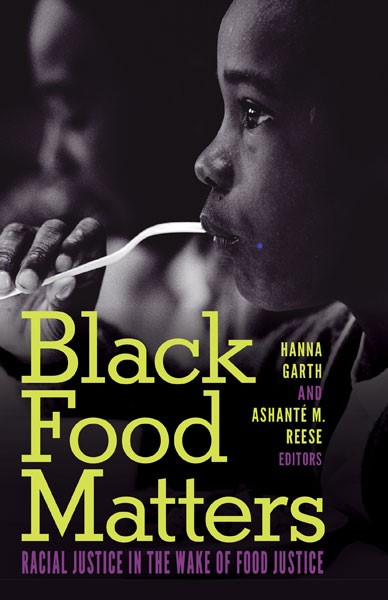Like me, you might have missed SAFN’s Black Food Matters Panel at Raising Our Voices—especially, since it was happening right about the same time that the AP was declaring victory for the Biden/Harris Presidential Ticket. But don’t despair. It is now available (along with all the other Raising Our Voices panels) on YouTube. And it really is worth a watch.
The Black Food Matters Panel celebrates the publication of the edited volume, Black Food Matters: Racial Justice in the Wake of Food Justice (University of Minnesota Press, 2020). It includes editors Hannah Garth (UC San Diego) and Ashanté M. Reese (U Texas, Austin), plus contributors Judith Williams (Florida International University), Billy Hall (American Association for the Advancement of Science), and Gillian Richards-Greaves (Coastal Carolina University).
The panel begins with participants reading short excerpts from their chapters: Reese reads from the Introduction to frame the volume’s objective: to problematize anti-Blackness and center Black experience and ways of knowing in food studies. Williams’ draws from her chapter focused on white authority and Black resistance in the South Florida food service industry. Hall’s contribution focuses on the commodification of Black food culture in the context of gentrification in the Overtown neighborhood of Miami. Richards-Greaves examines the ways that residents of Cool Spring, South Carolina draw together agricultural heritage and contemporary fears of global unrest to explain their commitment to food sovereignty. Reese reads from her chapter focused on black food entrepreneurship in the District of Columbia. And Garth brings a critical reflection to her collaboration with a “healthy food” program in South Los Angeles.
In the wide-ranging discussion that follows, the panelists’ offer critical reflections on the symbolic violence embedded in well-meaning food justice programs that perpetuate whitened body aesthetics (and capitalism) under the guise of health and nutrition. They consider the impact of COVID-19 on food sovereignty movements. They shed light on the injury and potential for “repair” by celebrity chefs who appropriate and enrich themselves through the “celebration” of Black foodways. And, in an echo of the message from Reese’s previous book, Black Food Geographies, the panelists emphasize the importance of self-determination and an orientation of the self “in-service to” the community, in the context of Black food and beyond. Catch the panel here: https://www.youtube.com/watch?v=RdrPrpk887s&feature=youtu.be
